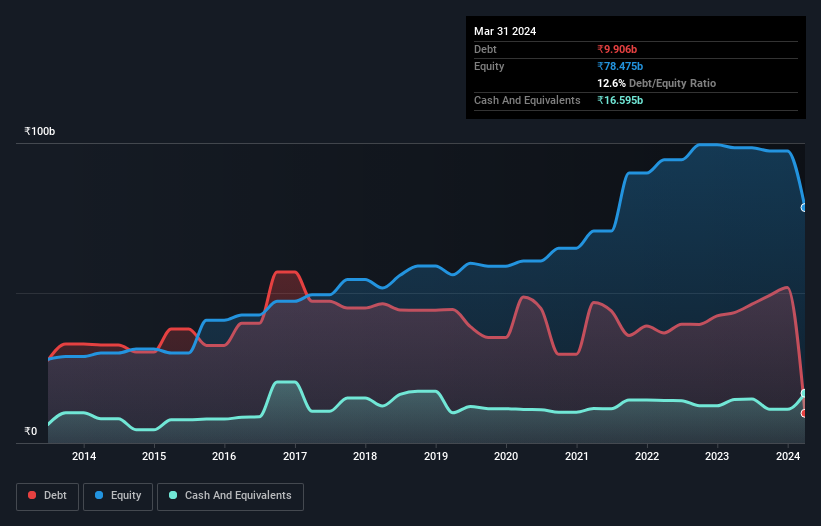Does Glenmark Pharmaceuticals (NSE:GLENMARK) Have A Healthy Balance Sheet?

The external fund manager backed by Berkshire Hathaway's Charlie Munger, Li Lu, makes no bones about it when he says 'The biggest investment risk is not the volatility of prices, but whether you will suffer a permanent loss of capital.' When we think about how risky a company is, we always like to look at its use of debt, since debt overload can lead to ruin. Importantly, Glenmark Pharmaceuticals Limited (NSE:GLENMARK) does carry debt. But should shareholders be worried about its use of debt?
When Is Debt Dangerous?
Debt is a tool to help businesses grow, but if a business is incapable of paying off its lenders, then it exists at their mercy. Ultimately, if the company can't fulfill its legal obligations to repay debt, shareholders could walk away with nothing. While that is not too common, we often do see indebted companies permanently diluting shareholders because lenders force them to raise capital at a distressed price. Of course, plenty of companies use debt to fund growth, without any negative consequences. The first step when considering a company's debt levels is to consider its cash and debt together.
Check out our latest analysis for Glenmark Pharmaceuticals
How Much Debt Does Glenmark Pharmaceuticals Carry?
You can click the graphic below for the historical numbers, but it shows that Glenmark Pharmaceuticals had ₹9.91b of debt in March 2024, down from ₹43.5b, one year before. However, its balance sheet shows it holds ₹16.6b in cash, so it actually has ₹6.69b net cash.

How Healthy Is Glenmark Pharmaceuticals' Balance Sheet?
Zooming in on the latest balance sheet data, we can see that Glenmark Pharmaceuticals had liabilities of ₹58.2b due within 12 months and liabilities of ₹6.92b due beyond that. On the other hand, it had cash of ₹16.6b and ₹18.6b worth of receivables due within a year. So its liabilities outweigh the sum of its cash and (near-term) receivables by ₹29.9b.
Of course, Glenmark Pharmaceuticals has a market capitalization of ₹349.1b, so these liabilities are probably manageable. However, we do think it is worth keeping an eye on its balance sheet strength, as it may change over time. While it does have liabilities worth noting, Glenmark Pharmaceuticals also has more cash than debt, so we're pretty confident it can manage its debt safely.
Importantly, Glenmark Pharmaceuticals's EBIT fell a jaw-dropping 63% in the last twelve months. If that earnings trend continues then paying off its debt will be about as easy as herding cats on to a roller coaster. There's no doubt that we learn most about debt from the balance sheet. But it is future earnings, more than anything, that will determine Glenmark Pharmaceuticals's ability to maintain a healthy balance sheet going forward. So if you're focused on the future you can check out this free report showing analyst profit forecasts.
Finally, a company can only pay off debt with cold hard cash, not accounting profits. Glenmark Pharmaceuticals may have net cash on the balance sheet, but it is still interesting to look at how well the business converts its earnings before interest and tax (EBIT) to free cash flow, because that will influence both its need for, and its capacity to manage debt. Over the last three years, Glenmark Pharmaceuticals saw substantial negative free cash flow, in total. While investors are no doubt expecting a reversal of that situation in due course, it clearly does mean its use of debt is more risky.
Summing Up
We could understand if investors are concerned about Glenmark Pharmaceuticals's liabilities, but we can be reassured by the fact it has has net cash of ₹6.69b. Despite the cash, we do find Glenmark Pharmaceuticals's EBIT growth rate concerning, so we're not particularly comfortable with the stock. Even though Glenmark Pharmaceuticals lost money on the bottom line, its positive EBIT suggests the business itself has potential. So you might want to check out how earnings have been trending over the last few years.
If you're interested in investing in businesses that can grow profits without the burden of debt, then check out this free list of growing businesses that have net cash on the balance sheet.
New: Manage All Your Stock Portfolios in One Place
We've created the ultimate portfolio companion for stock investors, and it's free.
• Connect an unlimited number of Portfolios and see your total in one currency
• Be alerted to new Warning Signs or Risks via email or mobile
• Track the Fair Value of your stocks
Have feedback on this article? Concerned about the content? Get in touch with us directly. Alternatively, email editorial-team (at) simplywallst.com.
This article by Simply Wall St is general in nature. We provide commentary based on historical data and analyst forecasts only using an unbiased methodology and our articles are not intended to be financial advice. It does not constitute a recommendation to buy or sell any stock, and does not take account of your objectives, or your financial situation. We aim to bring you long-term focused analysis driven by fundamental data. Note that our analysis may not factor in the latest price-sensitive company announcements or qualitative material. Simply Wall St has no position in any stocks mentioned.
Have feedback on this article? Concerned about the content? Get in touch with us directly. Alternatively, email editorial-team@simplywallst.com
About NSEI:GLENMARK
Glenmark Pharmaceuticals
Develops, manufactures, and sells generics, specialty products, and OTC pharmaceutical products in India, North America, Latin America, Europe, and internationally.
Excellent balance sheet and fair value.
Similar Companies
Market Insights
Community Narratives



